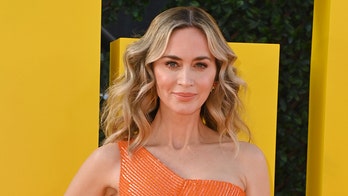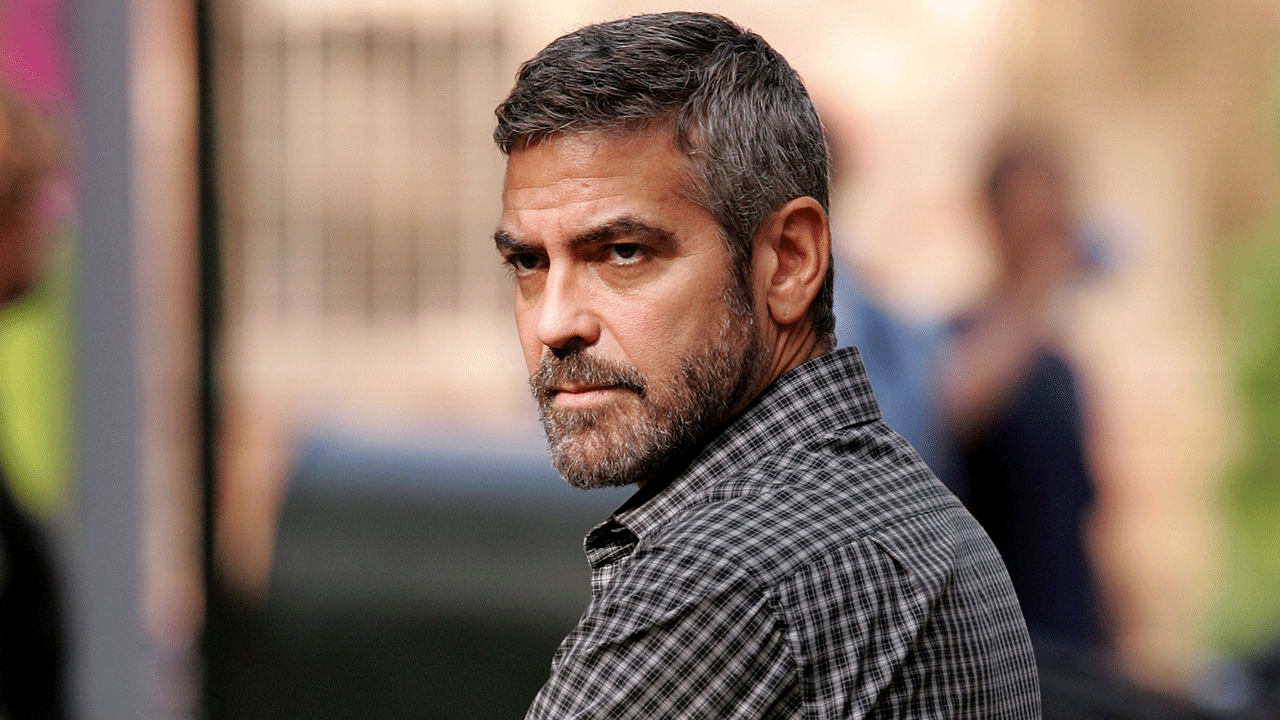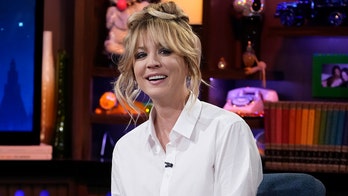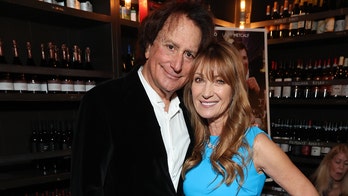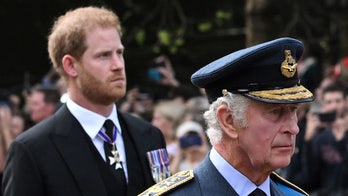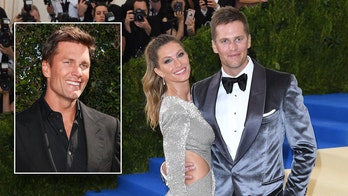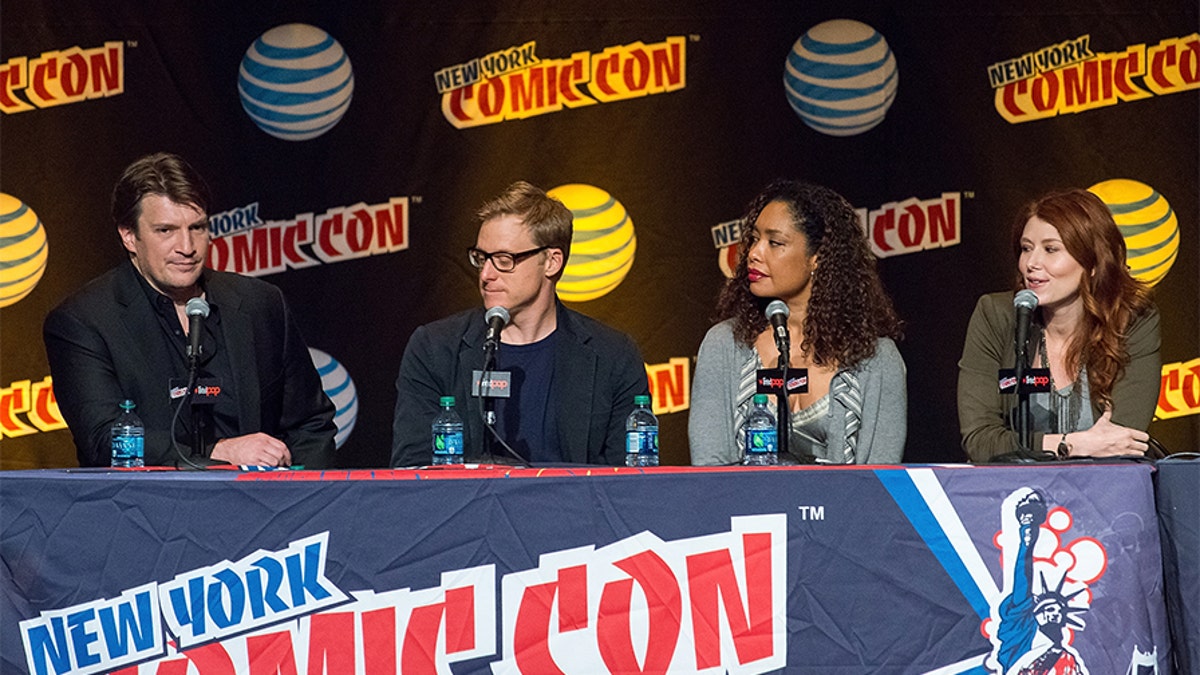
Actors Nathan Fillion, Alan Tudyk, Gina Torres and Jewel Staite attend the "Firefly Reunion" panel during New York Comic-Con Day 3 at The Jacob K. Javits Convention Center on October 10, 2015 in New York City. (Getty)
Of all of the brilliant TV shows created by Joss Whedon, none of them have as devoted a fandom as "Firefly" — yes, more devoted than "Buffy".
A clever fusion of sci-fi and western about a ragtag group of smugglers, "Firefly" was yanked around by its network before getting unceremoniously axed after 14 episodes.
'FIREFLY' CAST PAY TRIBUTE TO LATE STAR RON GLASS
If it was just your average show, that’s where "Firefly’s" story would’ve ended, relegated to the footnotes of TV history as some quaint series someone vaguely remembers.
Instead, 15 years to the day since it premiered, "Firefly" is still being lauded for its must-watch story of space underdogs, regularly included in “best of” lists and topping most “cancelled to soon” remembrances.
The tale of Mal Reynolds (the eternally charming Nathan Fillion) and his crew, Firefly was a brilliantly written genre series before the era of peak TV. In its short run, it managed to be a layered, fully realised world with compelling characters you want to root for — a remarkable feat considering its constraints.
After its cancellation, its fans, called Browncoats, lobbied and lobbied and lobbied for some kind of rescue. After healthy DVD sales, the cavalry came in the form of movie studio Universal, who gave Whedon $30 million to make a film sequel, "Serenity". It gave fans the resolution the series wasn’t allowed to entertain.
Set in a post-Earth future, humans have colonized space, but it hasn’t managed to do much about that pesky wealth gap between the rich and the poor. Before the start of the series, the flush central planets wage war on the plucky and much poorer independent planets, bringing them under one rule.
The independents (the Browncoats) was the side Mal and his first mate Zoe fought on and lost with. Whedon was inspired by the American Civil War in crafting his narrative — though not the unsavory slavery aspect — about what happens to those on the losing side who won’t be brought to heel by a central government.
"Firefly" mostly takes place on the outskirts of this world, where technology is sparse but injustice is rife. Hence the western part of the show — it captured that frontier almost-lawlessness.
A decade and a half on, the series still stands up, cementing its place in the pantheon of all the great TV that followed.
Of course, some of the performances weren’t as great as you remembered, or one or two characters feel a bit clunky — all things that would’ve settled if "Firefly" had been given a chance at, say, three or four seasons.
But the one facet of "Firefly" that is jarring to 2017 eyes is its treatment of race — specifically, its lack of Asian representation.
In the in-universe history of the “Earth-that-was," the United States and China eventually formed an alliance before the mass exodus. Consequently, the cultural milieu of "Firefly" is heavily steeped in Asian influences — the characters often swear in Chinese, there is Chinese writing in a lot of signage, they eat Asian food and the costumes and décor have an Asian aesthetic.
Yet there are no Asian characters. There is the occasional Asian actor in the background, generally in party scenes such as at the society ball in “Shindig”. But no one of Asian appearance gets any lines.
Even worse is that there are characters with Asian surnames played by white actors — Simon and River Tam (a Chinese/Vietnamese surname) are portrayed by Sean Maher and Summer Glau.
Of course, this is all from our 2017 perspective, with the last two years having been particularly active in pointing out “whitewashing” in Hollywood, from the likes of "Ghost in the Shell" to "Aloha". Just in the last month, Ed Skrein quit his role in the "Hellboy" reboot after it was pointed out that the character is of Asian descent. He was replaced by Daniel Dae Kim.
When "Firefly" was made in 2002, Asian representation was far from the mainstream cultural consciousness and the now-glaringly obvious omission would’ve barely been noticed then. Context matters, even if it makes for awkward cringing in a 15-years-later re-watch.
And "Firefly" certainly had more than its share of representation highlights, chief among them the character of Zoe, a highly competent, no-nonsense warrior woman played by Cuban-American actor Gina Torres.
But a re-watch is necessary because it is such a brilliantly written show with shade and morally compromised heroes. It was dead funny, in large part because of the lyrical cadence to its unique dialogue, and hearing those words again will take you back.
Above all, it was about family. It was about doing everything you can for the people you love and respect, even when the easier choice was to give up on them or give them up.
At a time of shifting global tensions and social friction, we all need a little something as unifying as "Firefly". Yep, it’s all about those warm and fuzzies.
Such is the outsized impact of "Firefly", one of its actors, Alan Tudyk has gone on to create Emmy-nominated satirical web series "Con Man", based around a fictionalized version of himself and his experiences in the fandom of "Firefly". Check it out on iTunes — it’s excellent.
In Sydney last month to promote "The Tick", Ben Edlund, a producer and writer who penned "Firefly" episodes “Jaynestown” and “Trash”, nailed it when asked why he thought Firefly had such staying power.
He told news.com.au: “I was really so fortunate to be part of it. It didn’t get a lot of airtime but that sci-fi universe has a real amount of depth, it was great.
“People still like to live in that world because it’s got dimension. It’s lasted and only become more illustrious.”
"Firefly’s" 15th anniversary DVD and Blu-ray edition will be released on September 27.
This article originally appeared on news.com.au.
